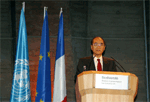 Opening of the International Conference “Biodiversity: science and governance – Deciding today to live tomorrow”The Director-General of UNESCO today opened the international conference entitled “Biodiversity: science and governance – Deciding today to live tomorrow” organized by the Government of France under the aegis of UNESCO, which is being held at the Organization’s Headquarters, from 24 to 28 January 2005.
Opening of the International Conference “Biodiversity: science and governance – Deciding today to live tomorrow”The Director-General of UNESCO today opened the international conference entitled “Biodiversity: science and governance – Deciding today to live tomorrow” organized by the Government of France under the aegis of UNESCO, which is being held at the Organization’s Headquarters, from 24 to 28 January 2005.The President of the French Republic, Mr Jacques Chirac; the President of the Republic of Madagascar, Mr Marc Ravalomanana; the Prime Minister of Malaysia, Mr Abdullah Badawi; the Prime Minister of Guinea Bissau, Mr Carlos Gomes; the Vice Minister of Environment and Natural Resources of Kenya, Nobel Peace Prize Laureate, Ms Wangari Maathai and Professor Edward O. Wilson, from the University of Harvard, participated in the opening session of the conference in which Mr Matsuura read a message from the Secretary-General of the United Nations, Kofi Annan.
In his address to participants, the Director-General of UNESCO invited the international community to learn the lessons of the recent events of South Asia where the loss of life and material destruction “is a stark reminder to us all of our vulnerability, on a planetary scale, since we are all connected to and dependant on our national environment and our lifestyles.”
“For my part,” said Mr Matsuura, “I have learnt of main lessons, all of which are relevant for this conference. The first is the importance of Earth observation systems which enable us not only to measure, but also to evaluate and analyse it evolution and thus to advance our knowledge of its complexity. The second lesson is that however vital science and technology may be to our ability to forecast natural hazards, there are limits to what it can do: we can not prevent natural hazards from occurring, but we should ready ourselves, with the right education and training, so that we can mitigate their consequences. The third lesson is that while we can not prevent natural hazards, early warning alert systems can limit the damage to human life. Such systems are up and running in certain regions. This is what was sorely lacking in the Indian Ocean. The fourth lesson is that access to science and technology is limited to a few whereas it should benefit all. The United Nations System is gearing itself up in that direction and UNESCO is playing its important part. Finally, the fifth lesson is the key role that healthy ecosystems play in diminishing the scale of such disasters.”
“Ensuring a sustainable environment implies knowing how to approach the complexities of the socio-economic, cultural, ethical and of course scientific issues of biodiversity. UNESCO’s programmes in the field of biodiversity are focused on water, marine, coastal and terrestrial ecosystems, basic sciences and biotechnologies, as well as the establishment of global change observation and monitoring systems. The interface between science and societies is at the heart of UNESCO’s work, particularly the linkages between water and biodiversity and ecosystems and biodiversity. Further, the relations between cultural diversity and biodiversity are receiving particular attention by UNESCO,” he recalled, before detailing the different programmes of UNESCO dedicated to biodiversity.
At the end of the morning session, the French President hosted a working lunch for the political and scientific personalities participating in the conference.
|
 United Nations Educational, Scientific and Cultural Organization
United Nations Educational, Scientific and Cultural Organization United Nations Educational, Scientific and Cultural Organization
United Nations Educational, Scientific and Cultural Organization Opening of the International Conference “Biodiversity: science and governance – Deciding today to live tomorrow”The Director-General of UNESCO today opened the international conference entitled “Biodiversity: science and governance – Deciding today to live tomorrow” organized by the Government of France under the aegis of UNESCO, which is being held at the Organization’s Headquarters, from 24 to 28 January 2005.
Opening of the International Conference “Biodiversity: science and governance – Deciding today to live tomorrow”The Director-General of UNESCO today opened the international conference entitled “Biodiversity: science and governance – Deciding today to live tomorrow” organized by the Government of France under the aegis of UNESCO, which is being held at the Organization’s Headquarters, from 24 to 28 January 2005.